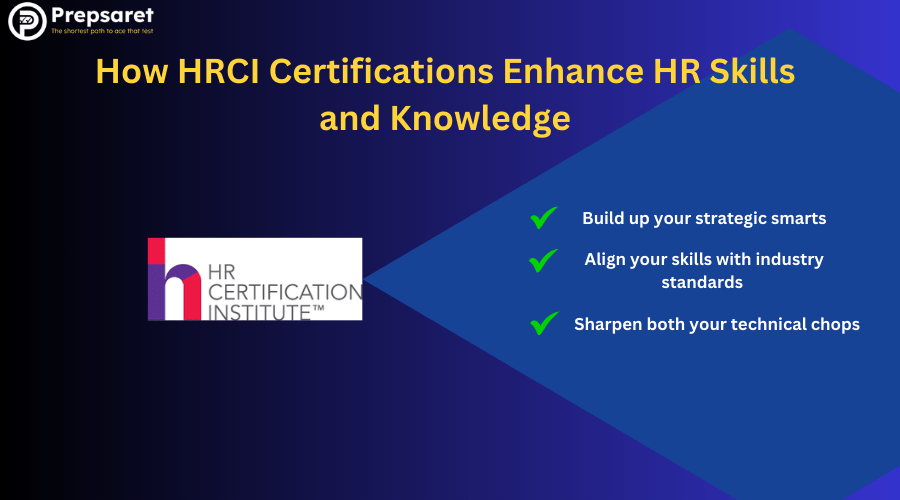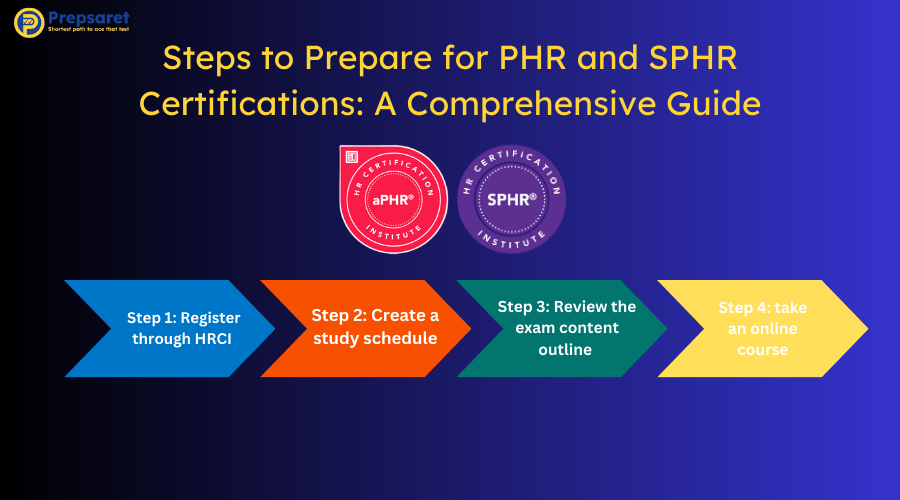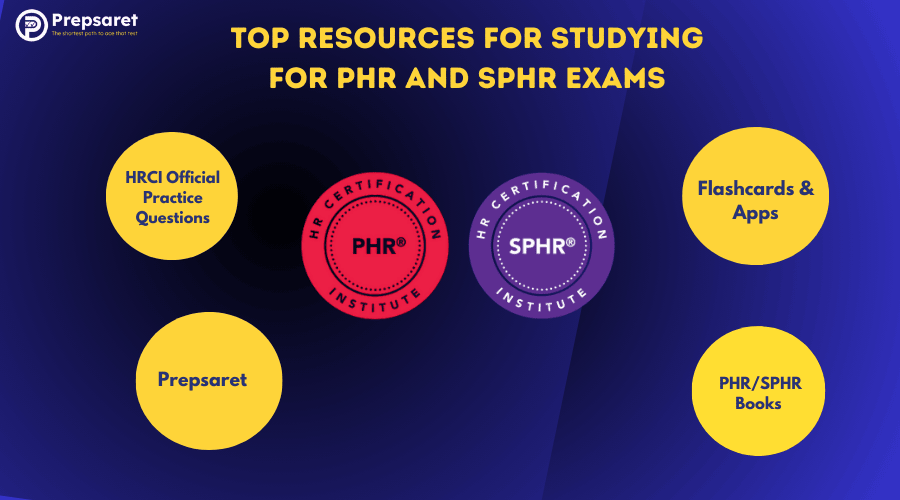HR Professional Development
The world of work is changing fast—and HR is right at the heart of it all. Whether it’s keeping up with new labor laws, building stronger company cultures, or helping people do their best work, HR professionals have a big job.
That’s why HR professional development is more important than ever. Investing in HR professional development programs not only ensures that HR professionals stay on top of the latest trends but also fosters an environment of continuous growth.
Getting certified with credentials like the PHR (Professional in Human Resources) or the SPHR (Senior Professional in Human Resources) can give your career a serious boost.
These certifications help you grow your skills, stand out in a crowd, and show the world that you mean business.
If you’re looking to increase your credibility, HR professional development certification programs are key to advancing your career. Additionally, SHRM certification is another valuable credential for professionals aiming for a high level of expertise.
If you’re thinking about leveling up your HR game, now’s the time. This guide will walk you through why HR professional development matters and how certifications like PHR and SPHR can open doors.
Let’s dive in—and hey, don’t forget to check out Prepsaret resources and courses at the end to get started.
The Importance of HR Professional Development in Today’s Workforce
Let’s be real: the workplace isn’t what it used to be. Remote work, new tech, shifting laws—it’s all changing, and fast. That means HR professionals need to keep learning just to keep up.
HR training isn’t just about reading the latest HR book (though we love a good read). It’s about gaining new skills, staying sharp, and making sure you’re ready to handle whatever comes next.
As the landscape of employee relations, performance management, and recruitment strategies evolves, HR professionals need to adapt and develop skills that align with these changes.
More and more, HR isn’t just about hiring or handling paperwork. It’s about leading strategy, driving culture, and helping companies grow. That’s why organizations are looking for HR pros who are trained, trusted, and ready to lead.
Leadership development and succession planning are becoming critical areas of focus for HR professionals who want to be at the forefront of their organization’s growth.
The bottom line? HR development isn’t optional—it’s essential. And the good news is: there are clear paths to grow, including HR certifications for beginners through to advanced HRCI certifications that provide targeted learning.
What Does the PHR Certification Entail and Why It Matters
Let’s start with the PHR, or Professional in Human Resources. This certification is perfect if you’re newer to HR or somewhere in the middle of your career. The PHR focuses on day-to-day HR work—think recruiting, onboarding, employee relations, benefits, and HR laws. It shows that you know how to keep a company running smoothly and follow all the rules while doing it.
If you’re working in HR and want to show you’re serious about your career, the PHR is a great step. It looks fantastic on a resume and helps employers see that you’re trained, tested, and trusted.
HR training topics for employees such as these can provide a broad understanding of the foundational HR areas you’ll be expected to master.
Continue reading: PHR Certification
The Benefits of Achieving SPHR Certification for Experienced HR Professionals
Now, if you’ve got more experience under your belt and you’re involved in the big-picture HR stuff—strategy, policy, and planning—the SPHR is for you.
The Senior Professional in Human Resources certification focuses on leading the HR function at a high level. It’s not just about doing the work; it’s about guiding teams, building company policies, and aligning HR with business goals.
The SPHR is ideal for senior HR pros, HR managers, or directors who want to move into executive leadership roles.
Plus, SPHR-certified professionals often earn higher salaries and are more likely to land top-level positions. They are well-prepared for organizational development initiatives and talent management.
If you want to lead—not just manage—HR, the SPHR is your ticket there.
Related blog post: SPHR Certification
Why PHR and SPHR Certifications Are Essential for Career Advancement
Want to move up the ladder? PHR and SPHR certifications are powerful career boosters. In a competitive job market, credentials help you stand out.
They prove that you’re not just coasting—you’re growing, learning, and aiming high. Many employers prefer or even require certification when hiring for leadership roles.
Having a PHR or SPHR on your resume can be the thing that gets you an interview—or gets you the job. It also gives you confidence, a stronger network, and the knowledge you need to make a real impact in your organization.
As HR professionals, you can also leverage these certifications to guide employee relations, enhance performance management, and build stronger recruitment strategies.
So if you’re ready to take your HR career to the next level, getting certified is one of the best moves you can make.
Key Competencies Covered in PHR and SPHR Certification Programs
Think of PHR as the foundation and SPHR as the fancy penthouse suite of HR knowledge. Both cover core HR functional areas, including:
- Business Strategy
- Talent Planning and Acquisition
- Employee and Labor Relations
- Total Rewards (Compensation and Benefits)
- Learning and Development
- Compliance and Risk Management
PHR focuses more on operational and technical responsibilities, while SPHR dives deeper into strategy, planning, and organizational leadership.
These certifications prep you for real-life HR challenges—like writing airtight policies, building a killer onboarding process, or navigating tricky compliance issues. It’s like HR bootcamp… but with fewer push-ups.
Enhancing Your Career with HR Professional Development
HR certifications aren’t just about credentials—they’re about your career. Whether you’re just starting out with HR certifications for beginners or advancing your skills with a SHRM certification, there are plenty of ways to level up.
By committing to career advancement strategies and continuously enhancing your knowledge in areas like diversity and inclusion in HR, compensation and benefits, or leadership development, you position yourself as a forward-thinking HR professional ready to meet the challenges of the future.
By actively engaging in HR professional development, you can be part of the next generation of HR leaders who drive company success through strategic initiatives and sound practices in succession planning, talent management, and organizational effectiveness.
How HRCI Certifications Enhance HR Skills and Knowledge

HRCI certifications like PHR and SPHR are more than just fancy letters after your name. They help you:
- Sharpen both your technical chops (think: compliance, recruiting, payroll stuff)
- Build up your strategic smarts (think: workforce planning, aligning HR with business goals)
- Align your skills with industry standards and best practices
It’s like going from good to great—and getting noticed for it. In today’s rapidly evolving HR landscape, continuous learning in HR is essential to stay ahead.
By pursuing certifications like PHR and SPHR, HR professionals gain not only immediate knowledge but also develop a skills development roadmap for ongoing career advancement.
Read on: HR Certification
Real-World Applications of PHR and SPHR Knowledge in HR Practices
So how does this certification stuff actually show up in your job? Here are a few everyday wins:
- Writing solid HR policies that protect both the company and its people
- Creating strategic workforce plans that look ahead, not just at today
- Making smarter decisions because you understand the legal, ethical, and business sides of HR
The real value comes from being able to leverage data analytics in HR to make informed decisions. Imagine being the go-to person in your company for navigating gray areas. That’s what certification helps you become.
By understanding both operational and strategic needs, you’ll also enhance your business acumen in HR, positioning you as a leader capable of driving long-term success.
Moreover, HR professionals can make an even greater impact by fostering global & cultural effectiveness in HR, ensuring alignment with diverse workplace needs.
Steps to Prepare for PHR and SPHR Certifications: A Comprehensive Guide

Ready to study? Here’s your no-stress game plan:
- Register through HRCI and pick your exam date
- Create a study schedule (yes, write it down!)
- Review the exam content outline so you know what’s coming
- Use official prep books and flashcards
- Join a study group or take an online course
- Take practice exams to spot gaps
- Rest well before the exam (seriously, sleep is a superpower)
To help you prepare, embrace networking for HR professionals by connecting with others in the field.
Engage in conversations about best practices, challenges, and innovative solutions, and actively participate in change management in organizations to improve your leadership skills and readiness for strategic HR roles.
The Role of Continuous Learning in HR Professional Growth
Getting certified is awesome, but the real magic happens when you keep learning. HR never stands still, and neither should you. With the rise of new HR technologies and processes, professionals must continuously evolve their expertise.
- Attend webinars and conferences to stay in the loop
- Explore micro-credentials in things like DEI, AI in HR, or international labor law
- Follow thought leaders and trends to keep your toolkit fresh
- Focus on SMART goals for professional growth to track your development and ensure you’re making steady progress
- Cultivate communication skills for HR leaders, as effective communication is key to driving organizational change and engaging employees
Learning = growth. Always.
Understanding the Differences Between PHR and SPHR Certifications
Not sure which path to take? Here’s a side-by-side look:
| Feature | PHR | SPHR |
| Focus | Technical & operational | Strategic & leadership |
| Experience Required | 1-2 years | 4-7 years |
| Best For | Early/mid-career HR pros | Senior HR leaders |
| Exam Content | Policy execution, compliance | Business strategy, HR leadership |
If you’re newer to HR or focused on daily tasks, go for PHR. If you’re making strategic decisions or managing teams, SPHR is your jam.
Both certifications are integral to developing a team leadership in HR roles, especially when coupled with a skills development roadmap that includes a focus on ethical decision-making in HR and labor and union negotiations.
Learn more: SPHR vs PHR
Top Resources for Studying for PHR and SPHR Exams

Want to study smarter? Start with these:
- Books: “PHR/SPHR Professional in Human Resources Certification Study Guide” by Sandra M. Reed
- Online Courses: Prepsaret HRCI Prep Courses, HRCP, BenchPrepHR
- Flashcards & Apps: Quizlet, Pocket Prep
- Practice Exams: HRCI official practice questions
- Study Groups: Join Facebook groups, Reddit threads, or HR communities on SHRM Connect
Sharing the journey makes it easier (and more fun), and allows for better cross-cultural sensitivity in HR, a crucial skill when navigating global HR practices.
How PHR and SPHR Certifications Contribute to Organizational Success
Your certification isn’t just good for you—it’s a win for your company too. Certified HR pros:
- Improve compliance and reduce risk
- Boost strategic alignment between HR and leadership goals
- Strengthen talent management with informed decisions
Hiring or promoting a certified HR professional? It’s like giving your organization a cheat code for success.
Certified professionals are better equipped to handle employee retention strategies and help future-proof HR careers by fostering an environment of continuous learning and project management for HR professionals.
In addition, they can navigate complex decisions in a way that ensures global & cultural effectiveness in HR and positions the organization for success in a diverse, dynamic global market.
Find out: How to Pass the SPHR Exam on Your First Attempt
FAQs
What Are The 5 P's Of Professional Development?
The 5 P's of professional development include Purpose (defining career goals), Plan (strategizing actions), Practice (applying learned skills), Progress (monitoring growth), and Performance (evaluating results).
These principles guide structured learning and career advancement.
What Is The Difference Between SHRM-CP and SHRM-SCP?
SHRM-CP (Certified Professional) focuses on operational HR tasks like policy implementation, while SHRM-SCP (Senior Certified Professional) emphasizes strategic leadership roles, requiring advanced expertise in aligning HR strategies with organizational goals.
What are the 5 Principles Of Professional Development?
The five principles of professional development are continuous learning, adaptability, goal alignment, collaboration, and self-reflection.
These principles ensure sustained growth by encouraging skill enhancement, teamwork, and alignment with personal and organizational objectives.
What Are The Five Stages Of Professional Development?
The five stages of professional development are Exploration (identifying interests), Establishment (building foundational skills), Growth (expanding expertise), Maintenance (sustaining performance), and Transition/Decline (shifting focus or retiring).
How To Grow Professionally In HR?
To grow professionally in HR, pursue certifications like SHRM-CP or SCP, attend industry events, network with peers, set clear goals, and stay informed about trends. Developing leadership, analytics, and communication skills can enhance career opportunities.

